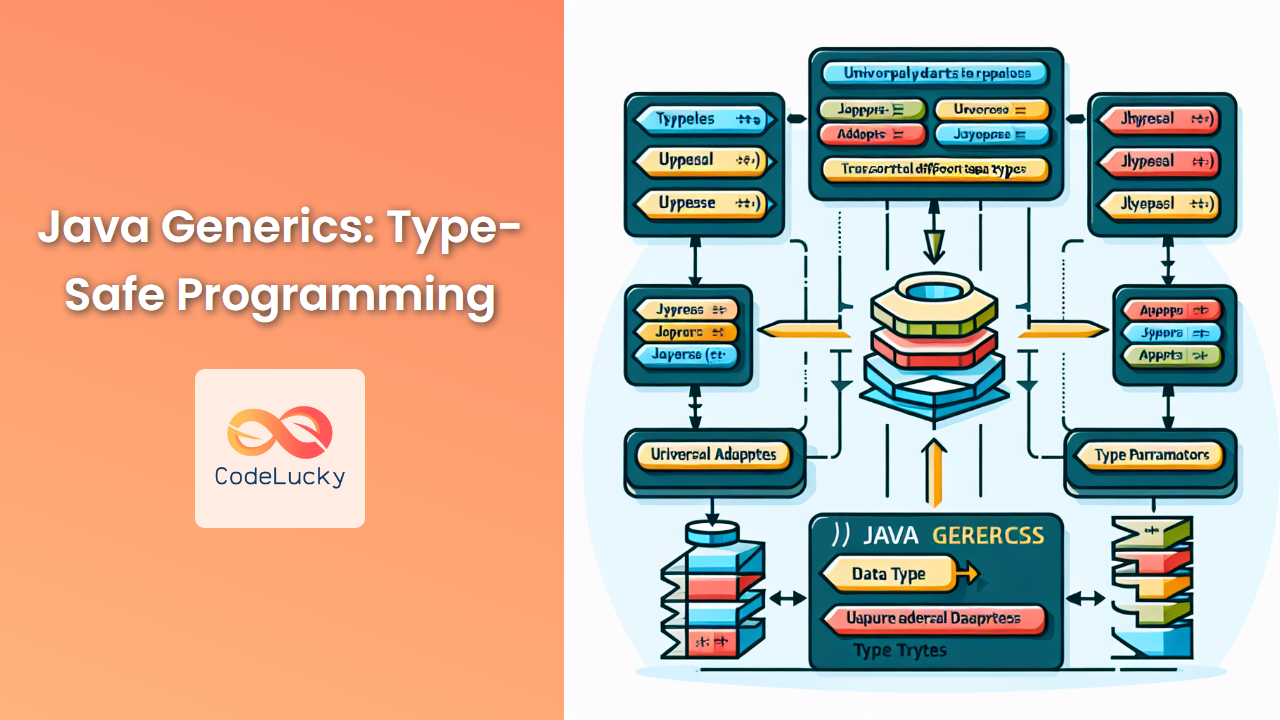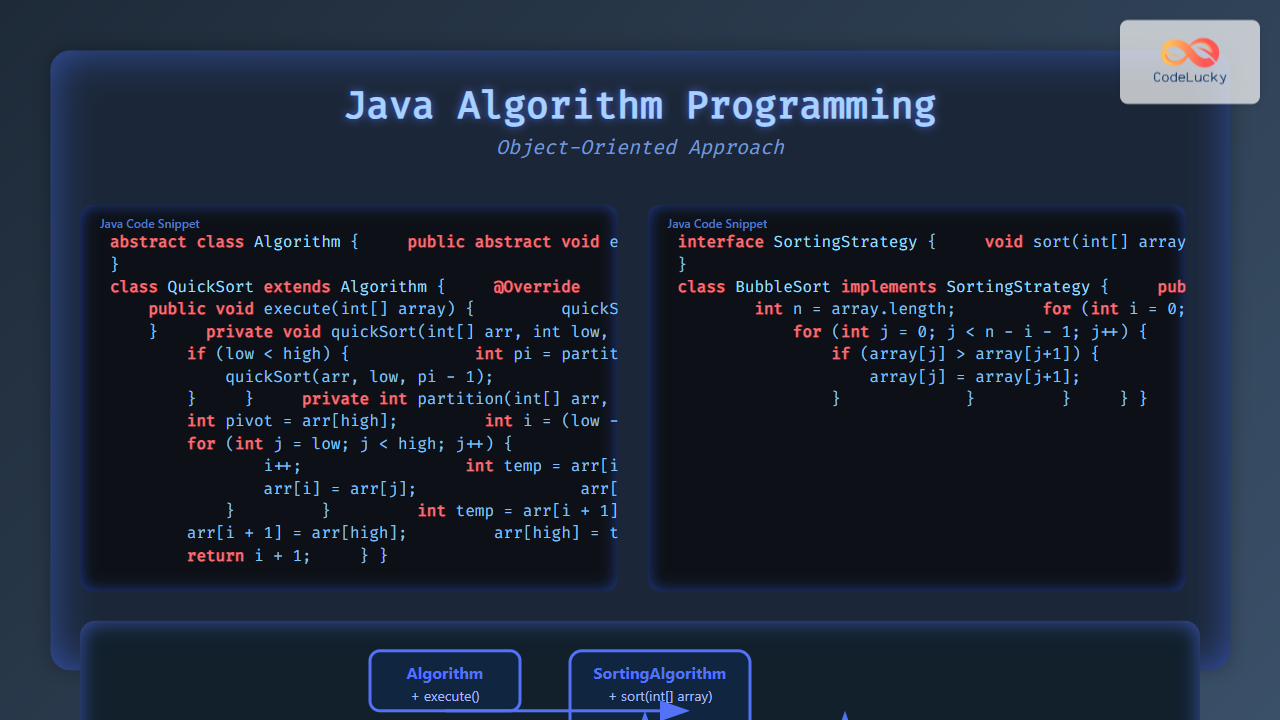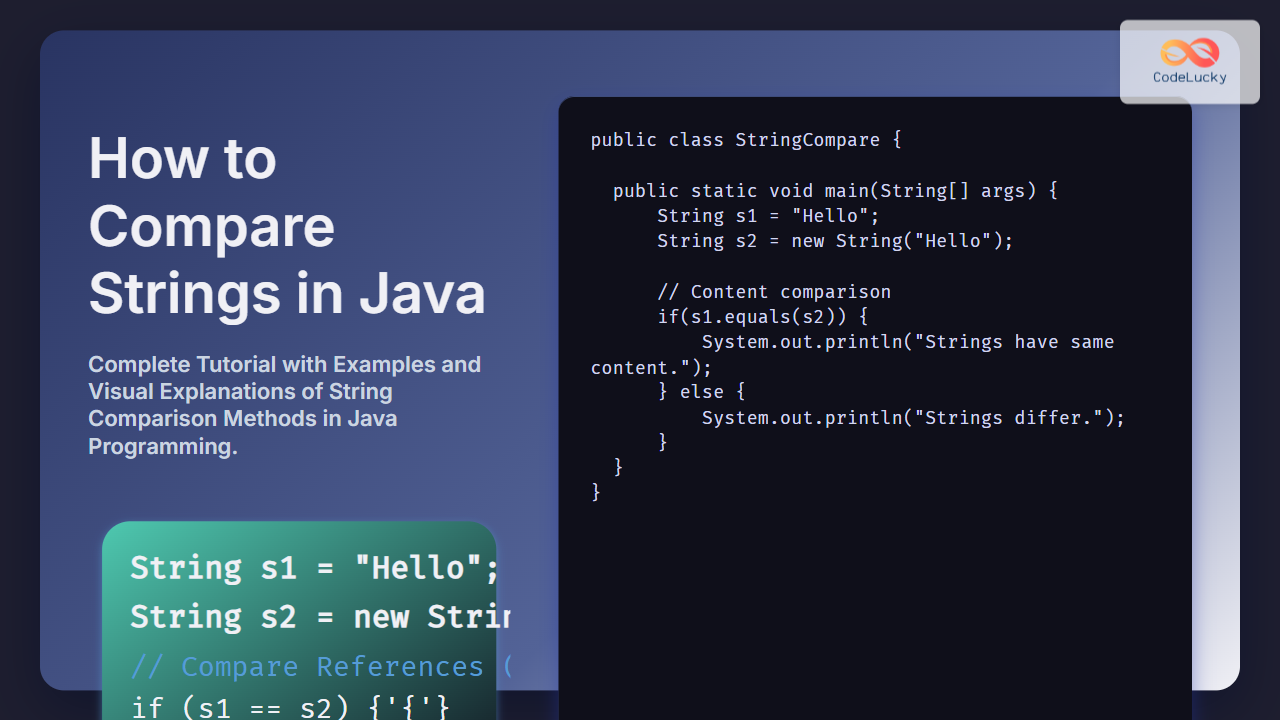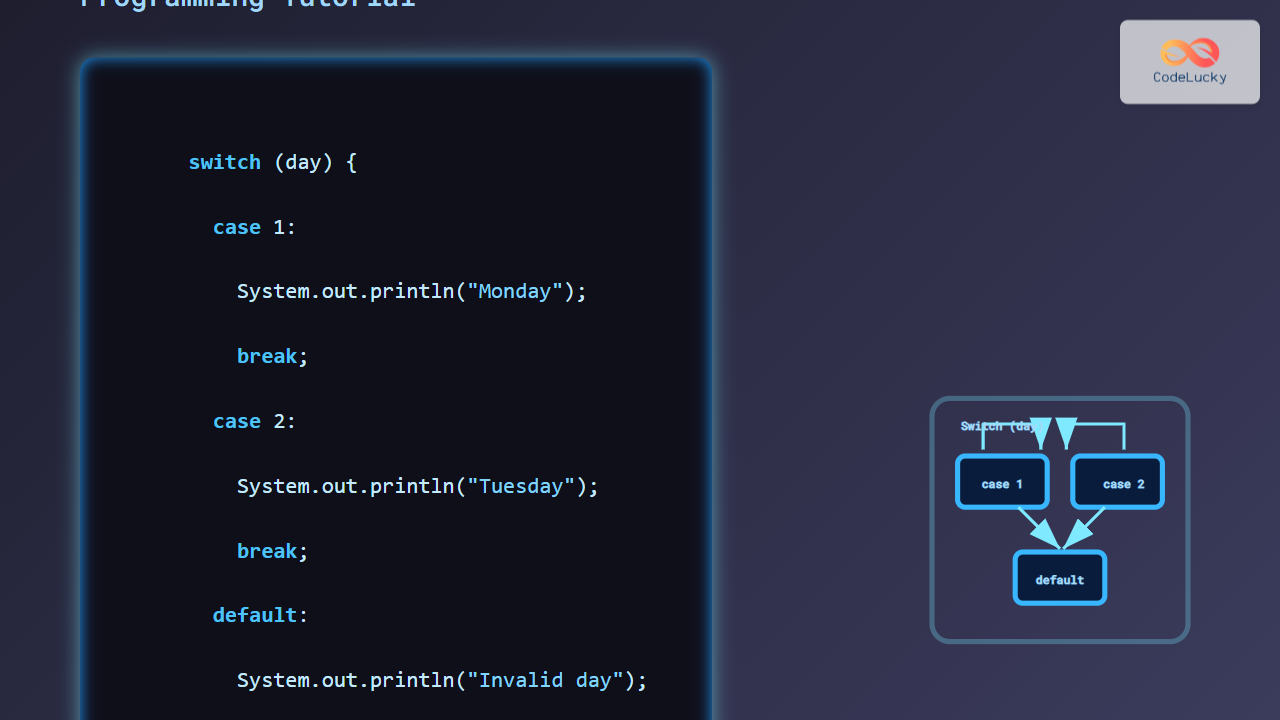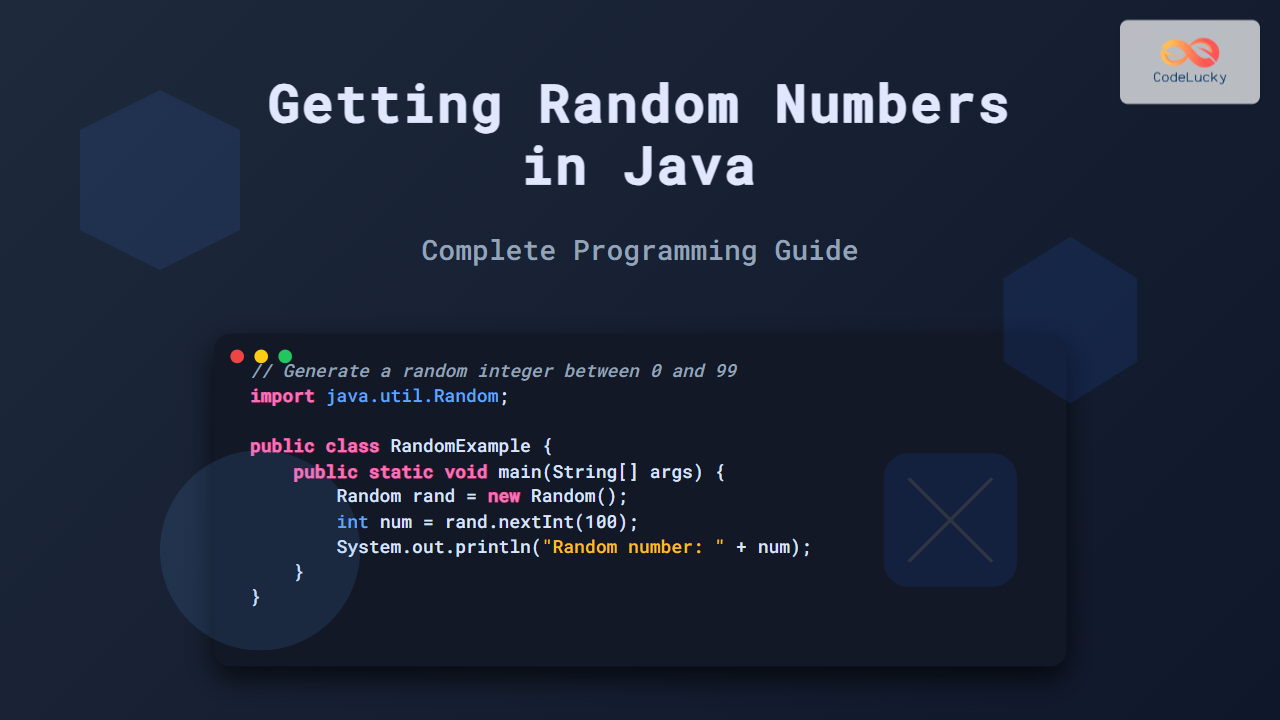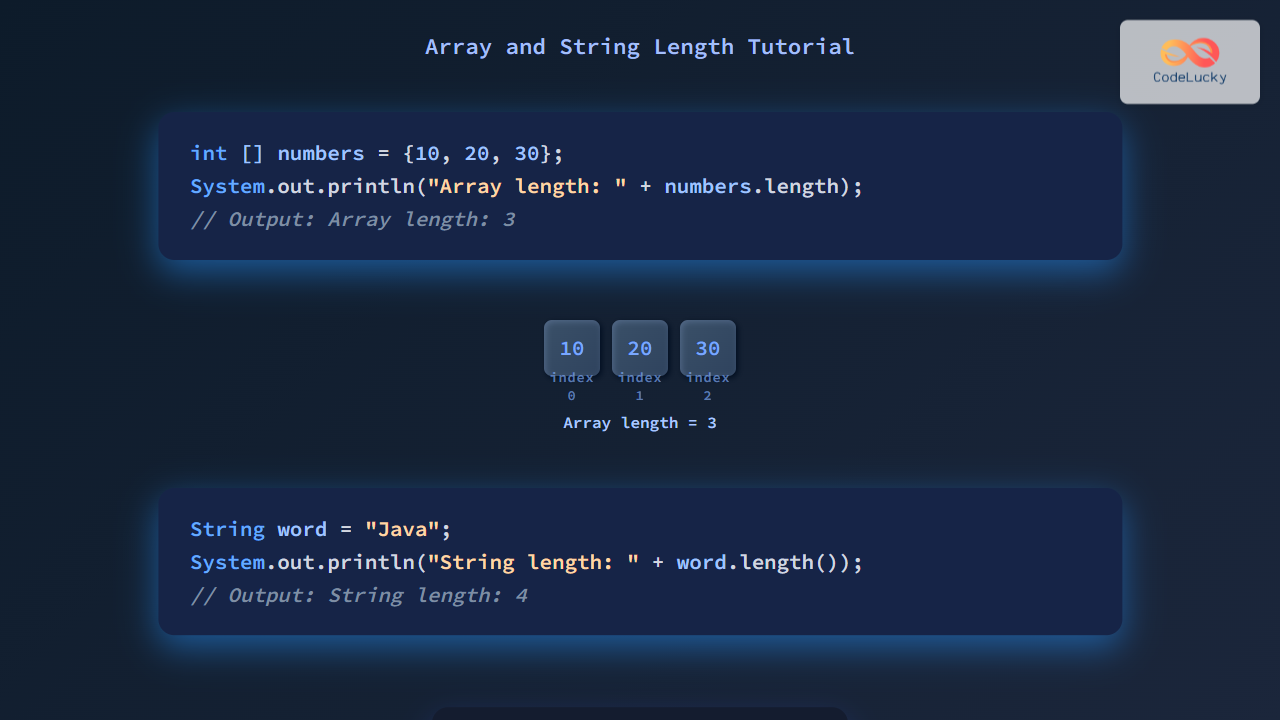Java Generics revolutionized the way developers write and maintain code by introducing type safety and reusability. This powerful feature, introduced in Java 5, allows you to create classes, interfaces, and methods that can work with different data types while providing compile-time type checking. In this comprehensive guide, we'll dive deep into Java Generics, exploring its concepts, benefits, and practical applications.
Understanding Java Generics
Generics enable you to abstract over types, creating code that can work with objects of various classes. This abstraction promotes code reuse and type safety, reducing the need for explicit casting and minimizing runtime errors.
🔑 Key Concept: Generics allow you to write a single class or method that can work with different types of data, ensuring type safety at compile-time.
Let's start with a simple example to illustrate the power of generics:
public class Box<T> {
private T content;
public void put(T item) {
this.content = item;
}
public T get() {
return content;
}
}
In this example, T is a type parameter that can be replaced with any reference type when the Box class is used. This allows us to create boxes that can hold different types of objects:
Box<String> stringBox = new Box<>();
stringBox.put("Hello, Generics!");
String message = stringBox.get();
Box<Integer> intBox = new Box<>();
intBox.put(42);
int number = intBox.get();
Benefits of Using Generics
Generics offer several advantages that make Java code more robust and maintainable:
- Type Safety 🛡️: Generics catch type errors at compile-time, preventing ClassCastExceptions at runtime.
- Code Reusability ♻️: Generic classes and methods can work with multiple types, reducing code duplication.
- Elimination of Casts 🎭: Generics eliminate the need for explicit type casting, making code cleaner and less error-prone.
- Better API Design 📐: Generics allow for more flexible and expressive APIs.
Generic Methods
In addition to generic classes, Java allows you to create generic methods. These methods can be particularly useful when you want to apply generic functionality to a specific operation without making the entire class generic.
Here's an example of a generic method that swaps two elements in an array:
public class ArrayUtil {
public static <T> void swap(T[] array, int i, int j) {
T temp = array[i];
array[i] = array[j];
array[j] = temp;
}
}
You can use this method with arrays of any reference type:
String[] names = {"Alice", "Bob", "Charlie"};
ArrayUtil.swap(names, 0, 2);
System.out.println(Arrays.toString(names)); // Output: [Charlie, Bob, Alice]
Integer[] numbers = {1, 2, 3, 4, 5};
ArrayUtil.swap(numbers, 1, 4);
System.out.println(Arrays.toString(numbers)); // Output: [1, 5, 3, 4, 2]
Bounded Type Parameters
Sometimes, you may want to restrict the types that can be used with a generic class or method. Bounded type parameters allow you to specify that a type parameter must be a subclass of a particular class or implement certain interfaces.
Here's an example of a method that finds the maximum element in a list, using a bounded type parameter:
public class MathUtil {
public static <T extends Comparable<T>> T findMax(List<T> list) {
if (list.isEmpty()) {
throw new IllegalArgumentException("List is empty");
}
T max = list.get(0);
for (T item : list) {
if (item.compareTo(max) > 0) {
max = item;
}
}
return max;
}
}
In this example, T extends Comparable<T> ensures that the type T must implement the Comparable interface, allowing us to compare elements in the list.
Let's see how we can use this method:
List<Integer> numbers = Arrays.asList(3, 7, 2, 5, 1, 9, 8);
Integer maxNumber = MathUtil.findMax(numbers);
System.out.println("Maximum number: " + maxNumber); // Output: Maximum number: 9
List<String> words = Arrays.asList("apple", "banana", "cherry", "date");
String maxWord = MathUtil.findMax(words);
System.out.println("Maximum word: " + maxWord); // Output: Maximum word: date
Wildcard Types
Wildcards in Java Generics provide even more flexibility when working with generic types. There are three types of wildcards:
- Unbounded Wildcard:
<?> - Upper Bounded Wildcard:
<? extends Type> - Lower Bounded Wildcard:
<? super Type>
Let's explore each of these with examples:
Unbounded Wildcard
Unbounded wildcards are useful when you want to work with objects of unknown type:
public static void printList(List<?> list) {
for (Object item : list) {
System.out.print(item + " ");
}
System.out.println();
}
This method can print lists of any type:
List<Integer> numbers = Arrays.asList(1, 2, 3);
List<String> words = Arrays.asList("Hello", "World");
printList(numbers); // Output: 1 2 3
printList(words); // Output: Hello World
Upper Bounded Wildcard
Upper bounded wildcards restrict the unknown type to be a specific type or a subtype of that type:
public static double sumOfList(List<? extends Number> list) {
double sum = 0.0;
for (Number num : list) {
sum += num.doubleValue();
}
return sum;
}
This method can work with lists of any Number subclass:
List<Integer> integers = Arrays.asList(1, 2, 3);
List<Double> doubles = Arrays.asList(1.1, 2.2, 3.3);
System.out.println("Sum of integers: " + sumOfList(integers)); // Output: Sum of integers: 6.0
System.out.println("Sum of doubles: " + sumOfList(doubles)); // Output: Sum of doubles: 6.6
Lower Bounded Wildcard
Lower bounded wildcards specify that the unknown type must be a supertype of a specific type:
public static void addNumbers(List<? super Integer> list) {
for (int i = 1; i <= 5; i++) {
list.add(i);
}
}
This method can add integers to a list of Integer or any supertype of Integer:
List<Number> numbers = new ArrayList<>();
List<Object> objects = new ArrayList<>();
addNumbers(numbers);
addNumbers(objects);
System.out.println("Numbers: " + numbers); // Output: Numbers: [1, 2, 3, 4, 5]
System.out.println("Objects: " + objects); // Output: Objects: [1, 2, 3, 4, 5]
Type Erasure
It's important to understand that Java Generics are implemented using type erasure. This means that generic type information is removed at compile-time and replaced with Object or the bounded type. This approach ensures backward compatibility with pre-generics code.
🔍 Note: Due to type erasure, you cannot perform certain operations with generics, such as creating arrays of generic types or using instanceof with generic types.
Here's an example illustrating type erasure:
public class Pair<T, U> {
private T first;
private U second;
public Pair(T first, U second) {
this.first = first;
this.second = second;
}
public T getFirst() {
return first;
}
public U getSecond() {
return second;
}
}
After type erasure, the class effectively becomes:
public class Pair {
private Object first;
private Object second;
public Pair(Object first, Object second) {
this.first = first;
this.second = second;
}
public Object getFirst() {
return first;
}
public Object getSecond() {
return second;
}
}
Best Practices for Using Generics
To make the most of Java Generics, consider the following best practices:
-
Use Generics Consistently: Apply generics throughout your codebase to maintain type safety and clarity.
-
Favor Generic Methods: When possible, use generic methods instead of generic classes to increase flexibility.
-
Use Bounded Type Parameters: Restrict type parameters when you need to ensure certain operations or methods are available.
-
Leverage Wildcard Types: Use wildcards to create more flexible APIs, especially when working with collections.
-
Be Aware of Type Erasure: Understand the limitations of generics due to type erasure and design your code accordingly.
-
Avoid Raw Types: Always specify type parameters when using generic classes to maintain type safety.
-
Use the Diamond Operator: In Java 7 and later, use the diamond operator (
<>) for concise instantiation of generic types.
Advanced Generic Concepts
As you become more comfortable with generics, you may encounter more advanced concepts:
Recursive Type Bounds
Recursive type bounds allow you to express more complex relationships between type parameters:
public class RecursiveNode<T extends Comparable<T>> implements Comparable<RecursiveNode<T>> {
private T value;
private RecursiveNode<T> next;
// Constructor and methods...
@Override
public int compareTo(RecursiveNode<T> other) {
return this.value.compareTo(other.value);
}
}
Generic Type Inference
Java 8 introduced improved type inference for generic instance creation:
Map<String, List<String>> map = new HashMap<>(); // Type inference in action
Intersection Types
You can use intersection types to combine multiple bounds:
public static <T extends Comparable<T> & Serializable> void processSerialized(T item) {
// Process item that is both Comparable and Serializable
}
Real-World Example: Generic Data Structure
Let's put our knowledge of generics into practice by implementing a simple generic binary search tree:
public class BinarySearchTree<T extends Comparable<T>> {
private Node root;
private class Node {
T data;
Node left, right;
Node(T data) {
this.data = data;
left = right = null;
}
}
public void insert(T data) {
root = insertRec(root, data);
}
private Node insertRec(Node root, T data) {
if (root == null) {
root = new Node(data);
return root;
}
if (data.compareTo(root.data) < 0)
root.left = insertRec(root.left, data);
else if (data.compareTo(root.data) > 0)
root.right = insertRec(root.right, data);
return root;
}
public boolean search(T data) {
return searchRec(root, data);
}
private boolean searchRec(Node root, T data) {
if (root == null)
return false;
if (root.data.equals(data))
return true;
if (data.compareTo(root.data) < 0)
return searchRec(root.left, data);
return searchRec(root.right, data);
}
public void inorder() {
inorderRec(root);
}
private void inorderRec(Node root) {
if (root != null) {
inorderRec(root.left);
System.out.print(root.data + " ");
inorderRec(root.right);
}
}
}
Now, let's use our generic binary search tree:
public class Main {
public static void main(String[] args) {
BinarySearchTree<Integer> intTree = new BinarySearchTree<>();
intTree.insert(5);
intTree.insert(3);
intTree.insert(7);
intTree.insert(1);
intTree.insert(9);
System.out.println("Inorder traversal of integer BST:");
intTree.inorder(); // Output: 1 3 5 7 9
System.out.println("\nSearching for 7: " + intTree.search(7)); // Output: true
System.out.println("Searching for 4: " + intTree.search(4)); // Output: false
BinarySearchTree<String> stringTree = new BinarySearchTree<>();
stringTree.insert("banana");
stringTree.insert("apple");
stringTree.insert("cherry");
stringTree.insert("date");
System.out.println("\nInorder traversal of string BST:");
stringTree.inorder(); // Output: apple banana cherry date
System.out.println("\nSearching for 'cherry': " + stringTree.search("cherry")); // Output: true
System.out.println("Searching for 'grape': " + stringTree.search("grape")); // Output: false
}
}
This example demonstrates how generics allow us to create a flexible, type-safe data structure that can work with different types of comparable objects.
Conclusion
Java Generics is a powerful feature that enhances type safety, code reusability, and API design. By leveraging generics, you can write more flexible and robust code that catches potential errors at compile-time rather than runtime. From simple generic classes to complex bounded type parameters and wildcards, generics offer a wide range of tools to improve your Java programming.
As you continue to work with Java, make generics an integral part of your coding practice. They not only make your code safer and more efficient but also contribute to creating cleaner, more maintainable codebases. Remember to consider type erasure limitations and follow best practices to make the most of this powerful feature.
By mastering Java Generics, you'll be well-equipped to tackle complex programming challenges and create versatile, type-safe solutions in your Java projects. Happy coding! 🚀👨💻👩💻

